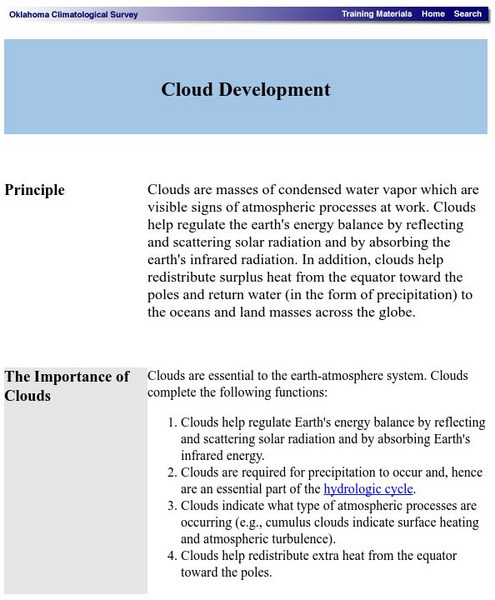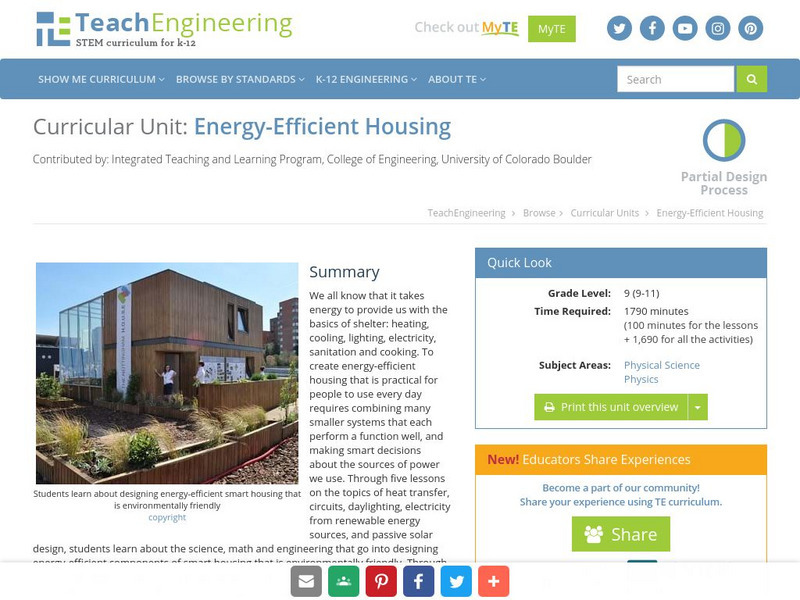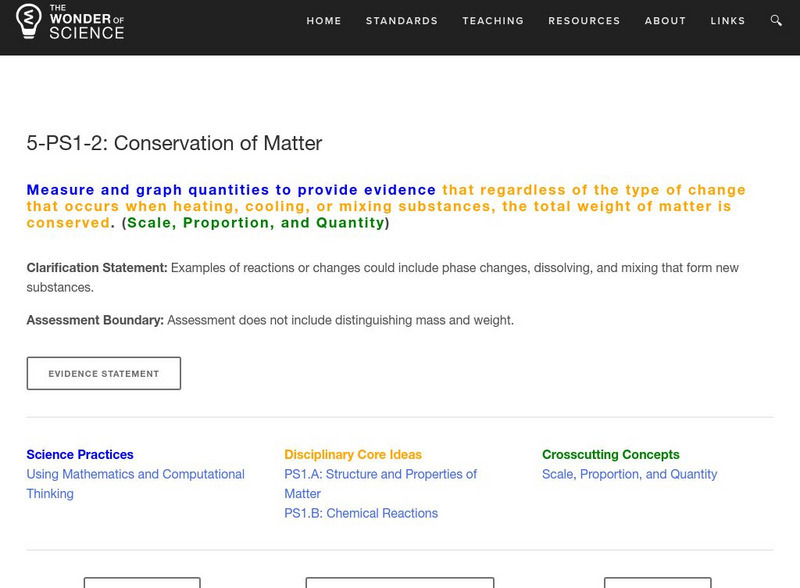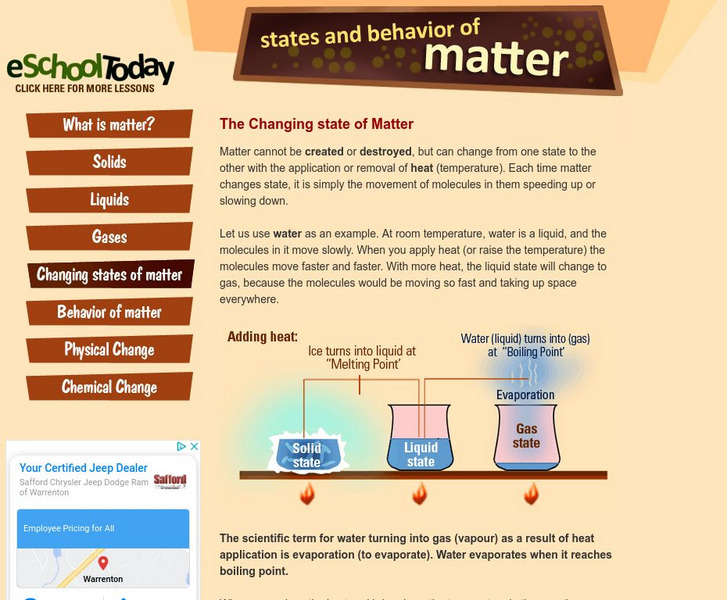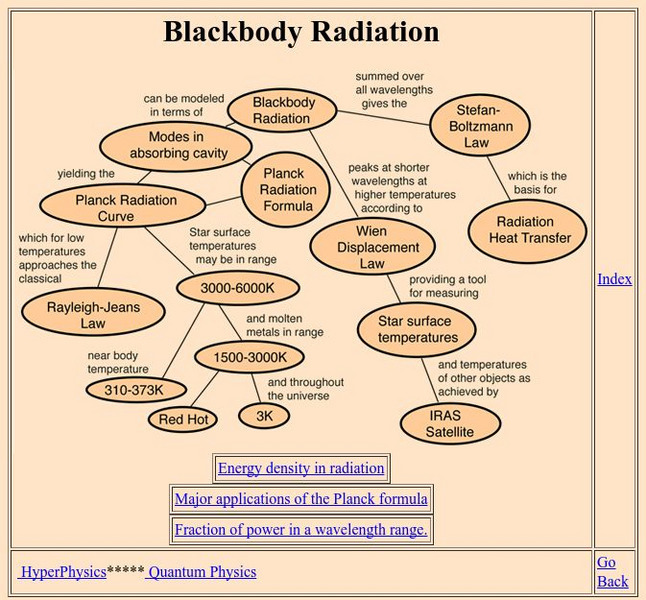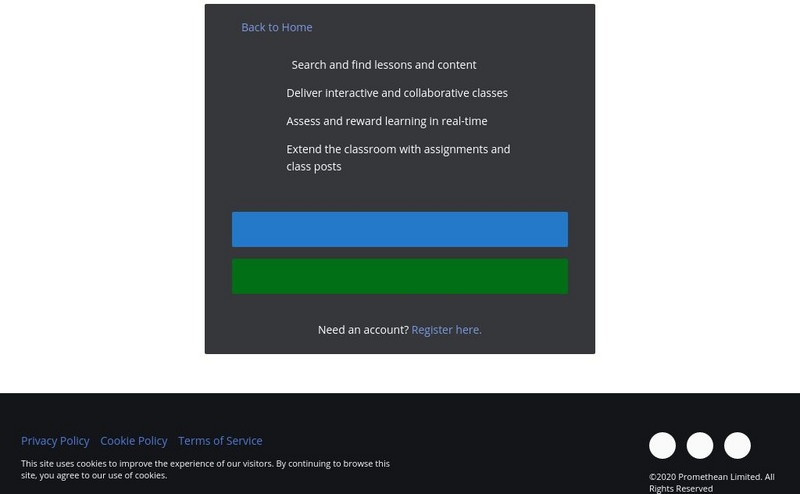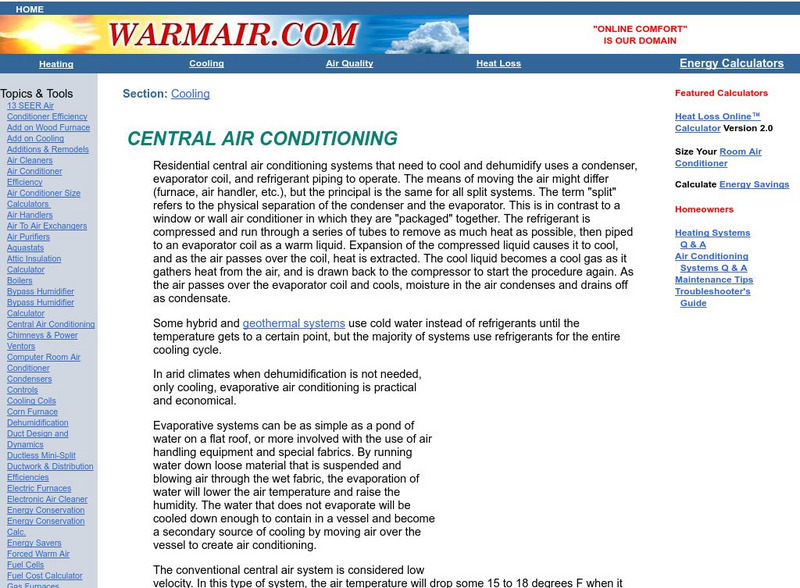E-learning for Kids
E Learning for Kids: Science: Loch Ness: What Happens When Solids and Liquids Are Heated or Cooled?
Students will look at what happens to different types of matter when they have a change of state.
American Chemical Society
Middle School Chemistry: The Ups and Downs of Thermometers
See how thermometers measure temperature by the molecular movement of the liquid inside.
Oklahoma Mesonet
Oklahoma Climatological Survey: Cloud Development
This site explores the importance of clouds and how clouds are formed. Content details common atmospheric cooling mechanisms and atmospheric stability.
TeachEngineering
Teach Engineering: Energy Efficient Housing
We all know that it takes energy to provide us with the basics of shelter: heating, cooling, lighting, electricity, sanitation and cooking. To create energy-efficient housing that is practical for people to use every day requires...
OpenSciEd
Open Sci Ed: 6.2 Thermal Energy Teacher Professional Development Overview
This four-day professional development session introduces teachers to the OpenSciEd materials generally in addition to the 6.2 Thermal Energy unit.
MadSci Network
Msn: How Does an Air Conditioner or Refrigerator Work?
From the Mad Scientist Network. Using a question and answer format, this page explains the answer to the question "How does An air conditioner or refrigerator work?" The scientific principles which underly their operation and the process...
Curated OER
Etc: Maps Etc: Heat Belts in North America, 1898
A map from 1898 showing the heat belts in North America. The map gives the boundary isotherms of the hot belt as a mean temperature of 70 degrees Fahrenheit and the cold belt as a mean temperature of 30 degrees Fahrenheit, indicating the...
The Wonder of Science
The Wonder of Science: 5 Ps1 2: Conservation of Matter
On this site, find a variety of materials to help students understand the conservation of matter. Create lessons that allow students to measure and graph quantities that could show even if matter is heated, cooled or combined with other...
CK-12 Foundation
Ck 12: Chemistry Simulation: Phase Change
[Free Registration/Login Required] Explore how heat and temperature relate to phase changes.
eSchool Today
E School Today: The Changing State of Matter
Learn about the changing states of matter.
CK-12 Foundation
Ck 12: Fifth Grade Science: Physical Science: Chemical Properties of Matter
A module that provides the definition of chemical property and examples of the chemical properties of matter using explanations, pictures, and review questions.
Georgia State University
Georgia State University: Hyper Physics: Blackbody Radiation
An indexing page for the HyperPhysics site. This page includes a concept map of links to pages that contain information related to blackbody radiation. Each individual page consists of informative graphics and clear explanations.
TryEngineering
Try Engineering: Solar Structures
During this lesson, students will construct a passive solar house from everyday items then explore how the sun's energy is used to heat and cool it.
American Chemical Society
Middle School Chemistry: Air, It's Really There
Explore the properties of air, and what happens to air when heated and cooled.
Other
Solar Cooking Archive
This website is brought to you by Solar Cookers International. You can view the site in English, German, Spanish, French, Italian and Portuguese. Check out how to build different types of solar cookers.
ClassFlow
Class Flow: Keeping Warm
[Free Registration/Login Required] Through this unit children build their ideas about temperature as a measure of how hot or cold objects are and learn about thermal insulators as materials that can help to keep things warm or cool.
SMART Technologies
Smart: States of Matter
This review of matter includes properties, volume, length, mass, and states of matter. Activities, games, and a Monster Quiz are include.
Other
Warm Air: Central Air Conditioning
The operation of conventional air conditioners are described. Their parts and the refrigerant/heat exchange cycle is discussed. The use of alternative geothermal systems are explained.
State Energy Conservation Office-Texas
State Energy Conservation Office: Renewable Energy Guide for Buildings [Pdf]
A basic guide for ways to be more energy-efficient and to use more renewable energy sources in a building. These include methods of reducing heat or cool air loss, ways of harnessing solar energy, and using the wind for ventilation.
State Energy Conservation Office-Texas
State Energy Conservation Office: Renewable Energy for the Home [Pdf]
Discusses different ways to heat and cool a home, and perform a variety of tasks, using renewable energy sources. Examples include window shades, a solar water heater, solar-powered toys, etc.
Curated OER
Warm Air: Central Air Conditioning
The operation of conventional air conditioners are described. Their parts and the refrigerant/heat exchange cycle is discussed. The use of alternative geothermal systems are explained.
ClassFlow
Class Flow: States of Matter
[Free Registration/Login Required] This flipchart describes the 3 states of matter and how materials can change through heating and cooling.
PBS
Pbs Teachers: Daredevil Ball Jump Ii Experiment
Make alterations in the variables of the original ZOOM Daredevil Ball Jump activity by heating or cooling the balls in the experiment. Predict how the balls' bounces will be affected by hot and cold, test the predictions and record the...
Curated OER
Educational Technology Clearinghouse: Maps Etc: Summer Monsoon in India, 1910
A map from 1910 of the Indian subcontinent and the Central Asia region showing the typical rainfall distribution patterns during the summer monsoons, keyed to show areas of rainfall ranging from very light to, according to this text, the...
Other popular searches
- Heating and Cooling
- Heating and Cooling Curves
- Science Heating and Cooling
- Heating and Cooling Curve
- Heating and Cooling Energy
- Heating and Cooling Systems
- Milk Heating and Cooling
- Heating and Cooling Water
- +Heating and Cooling


